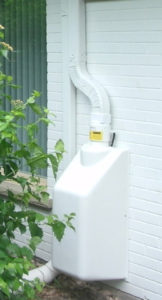Radon and Home Inspections: What Buyers and Sellers Need to Know
Because radon gas is such a frequent contributor to lung cancer, all home buyers should make a short-term radon test part of the home inspection.
Over 40% of Illinois homes have elevated levels of radon gas. Radon gas can be found in any building in any area of Illinois, regardless of age or style of house.
It has the capability of pushing up from the soil under the building’s foundation and pushing right through concrete basement and crawlspace floors.
The levels of radon can also fluctuate from year to year and even season to season, so it’s important to test radon levels when a home is for sale, regardless of whether another test was conducted a few years ago or if it already has a mitigation system.
Radon Testing for Home Sellers
As a home seller, you should know that many prospective buyers request the ability to have a home inspection company inspect the building, and frequently that includes a radon test.
They will be looking to see if the average radon levels for that period are above 4 picocuries per liter.
The action the tester will take is to set radon detection devices in the building for a handful of days. You will need to leave the devices undisturbed, keep windows closed, and a few other minor restrictions during that period.
It’s not a bad idea to hire your own home inspector when you put your house on the market so that you can uncover potential issues—including elevated radon levels—and avoid any unpleasant surprises when your buyer conducts their home inspection.
While DuPage Radon Contractors does not handle radon tests, they do have a trouble-free process for installing the radon mitigation systems, which keeps the sales process moving so as to not jeopardize a closing date. Don’t hesitate to reach out to us if your radon test results indicate elevated radon levels.
Radon Testing for Home Buyers
For the health of all future occupants, and to reduce cancer risk, before buying a home, you should always have the radon tested by an independent professional tester.
You will want to use an Illinois-licensed radon tester so there is no question about the validity of the test. Some home inspectors are also licensed to test for elevated radon levels.
Don’t accept tests performed by the seller, nor skip it because the home already has a radon mitigation system.
The amount of radon produced under the foundation of any building can change dramatically over time. An older radon mitigation system might not be keeping the radon at safe levels any longer.
The EPA recommends taking steps to lower radon gas when levels are at or above 4.0 picocuries per liter of air, so if the results of the home seller’s test are high, you should negotiate the installation of a radon mitigation system.
Radon Testing and Your Home Inspection: What to Expect
There are two types of radon tests: a short-term radon test, which typically takes a few days, and a long-term radon test which usually takes 90 days. Most home buyers and sellers use short-term radon tests to avoid delaying the sale.
A professional, licensed radon tester will place a radon test device, or devices, in the lowest livable area of the house, where it will collect the average radon level over a few days.
The Seller or occupant of the building will be instructed not to move the device, or open windows for extended periods, along with other minor restrictions. If you are the Seller, be sure you adhere to these restrictions. Air movement in a house is complicated. Breaking the rules in an effort to get lower results can often backfire and actually RAISE the radon test results.
As a home buyer, you may feel relieved if your home inspection reveals that radon levels are below 4.0 picocuries per liter of air (pCi/L). However, any level of radon can be harmful when you’re exposed to it for a long time.
The good news is that a modern radon mitigation system can often bring indoor radon levels below 2.0 pCi/L. Even if current radon levels are somewhere between 2.0 and 4.0 in the home you plan to buy, it may be worth installing a radon mitigation system. DuPage Radon Contractors can give you a price for getting your radon level below 4.0pCi/L and beyond.
Get in touch with us to learn more about getting a radon mitigation system installed in your home (or future home) today.







